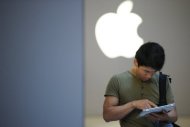Apple, which is expected to launch a mini version of its market-leading iPad tablet, could quickly overpower its rivals in the segment with the addition of the new product, analysts say.
The launch expected later this year however would probably prompt Apple co-founder Steve Jobs to roll over in his grave, given that the late technology pioneer ridiculed the small-screen tablets offered by his competitors.
Jobs once said the seven-inch (17.8-cm) screens for mini tablets should "include sandpaper so users can sand down their fingers" to be able to use onscreen keys.
But analysts say the market has changed since Jobs died last October.
Amazon's Kindle Fire proved popular last year, and the small-format Google Nexus 7 joined the Samsung Galaxy in the hot tablet market, dominated by the iPad, which has a screen of nearly 10 inches (24.6 centimeters).
Rumors about the smaller iPad have been swirling for months, but the Wall Street Journal reported this week that Apple's component makers in China are gearing up for mass production of the device.
"Despite what Steve Jobs claimed, the seven-inch form factor is popular and very useful if you want true portability," said analyst Jack Gold at J. Gold Associates.
"Also, seven-inch is less expensive and so they can compete for the lower end of the tablet market."
Analyst Tom Mainelli at research firm IDC said Apple has discovered that larger tablets are not universally popular, noting that users in Japan "with a more mobile culture" may prefer a smaller format, which also may be better for education in primary schools.
If Apple sells the new device at less than $300, as widely expected, Mainelli said, "they put a hurt on all Androids."
Mainelli said that a mini iPad "ultimately grows the market," and that Apple does not appear to be perturbed by others in the field, since it makes a profit on the devices, unlike some other manufacturers.
Andy Hargreaves, an analyst at Pacific Crest Securities, said in a note last week that he expects Apple will sell 35 million iPad mini units in the coming year at $299, "with 25 percent cannibalization of the larger iPad."
"Apple is a approaching a tremendous period of product cycle strength, with anticipated launches of a new iPhone, a 7.85-inch iPad and a refreshed 9.7-inch iPad that are likely to drive strong profit growth and corresponding stock appreciation," Hargreaves said.
Among the many reports circulating was one on the Apple tracker blog iMore, which said a new 7.85-inch iPad would come with "aggressive" pricing at $200 to $250.
This would "do to the tablet market what Apple did to the MP3 market in 2004 with the expansion of the iPod product line -- leave absolutely no space for competitors," a blog post by Rene Ritchie said.
Apple shares rose 1.76 percent to $609.94 on Thursday, and Hargreaves upped his price target on the company to $690 per share. Another analyst, Brian White at Topeka Capital markets, raised his target price for Apple to $1,111.
Apple held 65 percent of the market in the first quarter with 11.8 million iPad shipments, according to ABI Research.
The market leader, however, faces tougher competition as Samsung, Amazon, Microsoft and Googleroll out competing devices.
Analyst Rob Enderle of Enderle Group said that now that the new, smaller format has proven popular, "I don't think Apple has any choice but to go into this segment."
He said the new Apple device "will both cannibalize 10-inch (iPad) sales and broaden the market but it will also give Apple a line of offerings in what, prior to Apple, was not a one-size-fits-all world."
Enderle said Apple is in a fierce battle with Korean rival Samsung across several product lines including tablets and smartphones, and this is forcing the Cupertino-based giant to adapt.
Apple executives are also likely to introduce a larger screen for its popular iPhone to compete with those using the Google Android operating system, according to Enderle.
"Their tardiness in moving to four- and five-inch phones has dropped them well off the smartphone leadership position they once owned and has been handing that market to Google, they shouldn't repeat that mistake here."












0 comments
Post a Comment